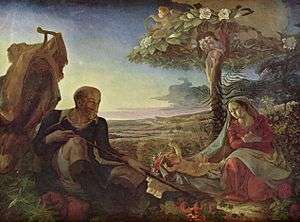Matthew 2:15

Matthew 2:15 is the fifteenth verse of the second chapter of the Gospel of Matthew in the New Testament. Joseph has taken Jesus and his family to Egypt to flee the wrath of King Herod.
In the King James Version of the Bible the text reads:
- And was there until the death
- of Herod: that it might be
- fulfilled which was spoken of
- the Lord by the prophet, saying,
- Out of Egypt have I called my son.
The World English Bible translates the passage as:
- and was there until the death of
- Herod; that it might be fulfilled
- which was spoken by the Lord
- through the prophet, saying,
- "Out of Egypt I called my son."
For a collection of other versions see BibRef Matthew 2:15
Herod is believed to have died in March or April of 4 BC. The Gospel gives little detail about the Holy Family's time in Egypt, but there are a number of apocryphal tales filling in this period. These stories of the time in Egypt have been especially important to the Coptic Church, which is based in that country. Throughout Egypt there are a number of churches and shrines that claim to mark an area where the Holy Family stayed. The most important of these is the church of Abu Serghis that claims to be built on the place the family had its home.
This verse contains Matthew's third direct quote from the Old Testament. This brief line is from Hosea 11:1. It is not a direct copy from any extant version of Hosea. The most important change is that the author of Matthew replaces "my children" with "my son". This verse in Hosea is fairly clearly a description of the events in the Exodus, and not a piece of prophecy. Why Matthew seems to take this brief quote out of context and away from its original meaning has been long disputed by scholars. A number of theories have been advanced to explain this discrepancy. Some scholars have argued that the traditional view of Hosea is wrong and that the piece is actually a prophecy. According to those who support the doctrine of sensus plenior the author of Hosea may not have been aware that he was writing a prophecy, but only because he did not fully understand that the divine spirit ensured this secondary meaning was included. Others support the controversial view that the author of Matthew made significant use of midrashic techniques in his gospel.
References
- Albright, W.F. and C.S. Mann. "Matthew." The Anchor Bible Series. New York: Doubleday & Company, 1971.
- Brown, Raymond E. The Birth of the Messiah: A Commentary on the Infancy Narratives in Matthew and Luke. London: G. Chapman, 1977.
- The use of Hosea 11:1 in Matthew 2:15 (pdf)
| Preceded by Matthew 2:14 |
Gospel of Matthew Chapter 2 |
Succeeded by Matthew 2:16 |
| ||||||||||||||||||||||
| ||||||||||||||||||||||||||||||||